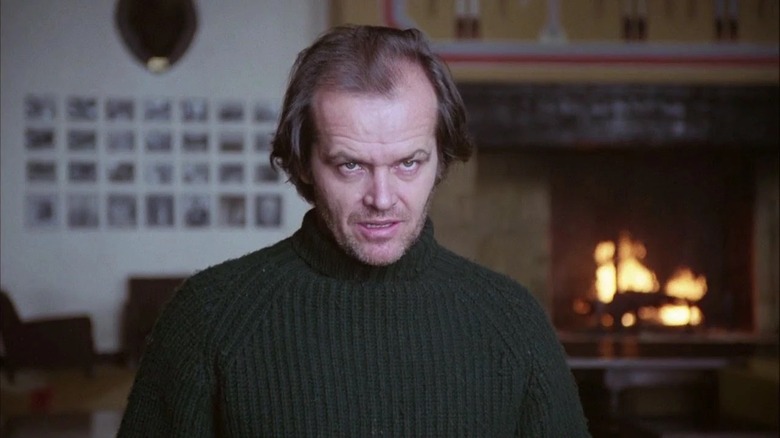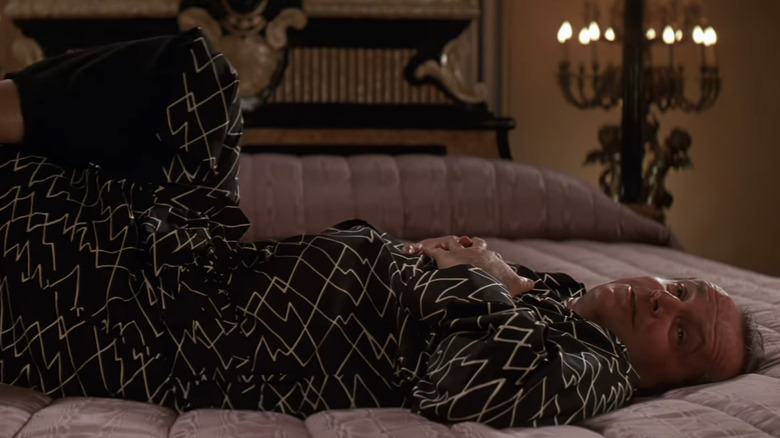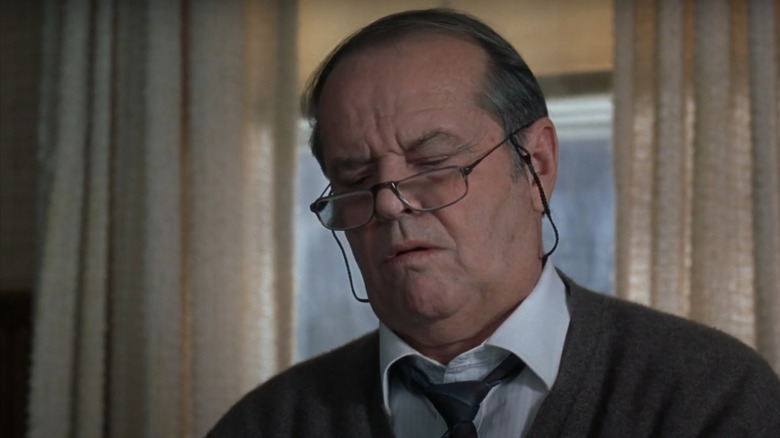Stanley Kubrick Said Jack Nicholson Brought One 'Unactable Quality' To His Roles
Jack Nicholson is missing in action. The star's last acting role was the 2010 rom com "How Do You Know," and aside from showing up in news stories about his personal life, he's seemingly done with the whole acting thing.
Since his last role, he's been heard to remark that his apparent retirement is down to the fact that he only wants to do "films that move people," and that he has a feeling that "maybe people in their twenties and thirties don't actually want to be moved anymore." In the age of the MCU and the general franchizification of movies, Nicholson seems to think that people want to see "more bombs" and "more explosions" and he's made clear he'll "never do that type of movie."
That all seems slightly at odds with his general reputation as a roguish trickster who can go from playing the murderous Jack in "The Shining," to the Joker, to cutting up in an Adam Sandler comedy, all while bringing a vaguely menacing yet fun energy to each. But his numerous other characters, such as the world-weary retiree of "About Schmidt" or Garrett Breedlove in "Terms of Endearment" demonstrate Nicholson's commitment to acting as a craft, and showcase his desire to make these "films that move people". Despite the perception of him as a playful rascal with a slightly sinister edge (it has been said that he plays crazy a little too well), the Oscar winner's entire career is a testament to his unique and varied talents as an actor. And according to Stanley Kubrick, there's a simple reason for why.
'The one unactable quality'
There's a moment in "Terms of Endearment" — the script for which made Nicholson cry — when his character, Garrett Breedlove, tells Shirley MacLaine's Aurora Greenway, "You do bring out the devil in me." It's unclear whether writer/director James L. Brooks was intentionally poking at audiences' perception of Nicholson as a devilish mischievous type, but the line delivery feels knowing. Either way, the actor obviously had something about him that brought Lucifer to mind, as he would go on to star as Daryl Van Horne, aka the Devil, in 1987's "The Witches of Eastwick."
While preparing for the role, he was visited by the New York Times' Ron Rosenbaum, who, on his trip to meet the star at his home, noted how immersed in research Nicholson was. The actor, who had been poring over Dante's 'Inferno,' Aquinas, and contemplating various thinkers' definitions of evil, apparently told him: "I want people to think Jack Nicholson is the Devil. I want them to be worried.”
In the presence of such obvious commitment to the role, Rosenbaum also noted that Nicholson's "The Shining" director, Stanley Kubrick "has said of Nicholson that he brings to a role the one unactable quality — great intelligence." And if a famously cerebral director of Kubrick's caliber says it, it obviously means something.
Nicholson prefers smart talk
Far from being a one-dimensional, lovable rogue character, Nicholson has always maintained an inquisitive and intelligent approach to acting that has led to a diverse career. As he told Roger Ebert back in 1983 when discussing what drew him to "Terms of Endearment:" "I prefer movies with smart talk in them."
It's this intelligence that has no doubt allowed him such longevity and is likely why he has such a commitment to making films that "move people." Often that intelligence leads to some unorthodox methods, like how when filming "The Departed" Nicholson brought some surprise NSFW props to set as a way of developing his character and the scene. But on the whole, his insightful approach to his craft has made for one of the great Hollywood careers.
Now, content with his body of work as it is, Nicholson doesn't sound like he'll be showing up as the next mo-cap villain of a Marvel movie — though part of me hopes he does. Someone without the kind of intellect that Kubrick noticed might well have no qualms about showing up in movies with non-stop "bombs" and "explosions." And while there's nothing wrong with those films, there's something quite nice about Nicholson quietly bowing out and being intelligent enough to know where he doesn't belong.


